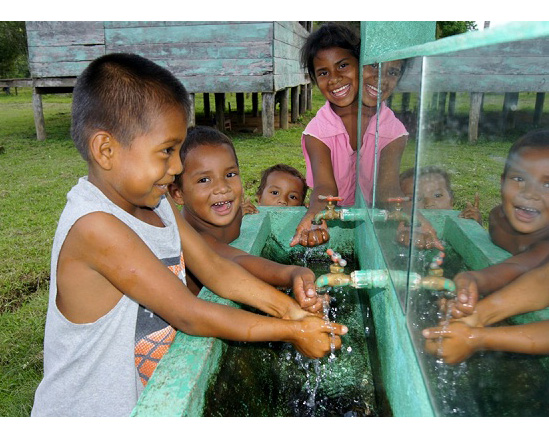

Unity is strength in Nicaragua

Until recently, the women of Venus, a small community in northeastern Nicaragua, spent a part of each day searching for and collecting drinking water. Despite being surrounded by rivers that spring from the Central America’s most important rainforest, the Bosawas Biosphere, the communities here had no potable water.
That was before 24-year-old Fátima Luna and her women neighbors decided to put an end to the situation. They approached the mayor of their municipality of Bonanaza with a proposal to create the Potable Water Committee (CAP) of Venus, a network that would supply drinking water to the entire community.
"When we proposed the project, most women decided to support it, because it was necessary,” says Luna, the committee’s coordinator. “When we were told that the MDG-Fund would provide funds and that we had 90 days to install the pipe, we decided to grab shovels and spades. The result was that the pipes were laid in 45 days,” she adds proudly.
The Venus community water project is an initiative of the joint UN programme "Governance of the Water and Sanitation Sector in the RAAN and RAAS", one of six in Nicaragua funded by the Millennium Development Goals Achievement Fund (MDG-Fund) to support Nicaragua’s efforts to combat poverty and reduce inequalities.
The programme provided workshops on water and sanitation to leaders in the largely indigenous and Afro-descendant communities in Nicaragua’s North Atlantic Autonomous Region (NAAR), where less than 20 % of the population had access to water and sanitation. "The greatest impact has been felt in the home because we are the ones who most needed the water,” says CAP coordinator Luna. “As women we know what our needs are, given that we do 90% of our housework with water."
But the project presented challenges. "The difficulty is that the community is located in a mining area and there are many rocks,” says Francisco Reyes, head of the project’s infrastructure. “There were entire days that we spent breaking apart rocks with just chisels and mallets. But that didn’t lower morale, on the contrary, it brought us closer together as a community because when a family encountered such problems, others who were further along in laying their pipes supported them, "he explains.
A greater challenge was collecting fees for the installation of the water system from the inhabitants of Venus and the neighboring village, Unión. But what had been an obstacle because a blessing. "We decided to join together and embark on the project,” says Reyes. “Now our community is called Venus Unión instead of Venus, as the water project united us to move forward.”
The community contributed 296,000 córdobas (US$11,800) to the project, which benefits more than 400 people, with the the joint programme contributing and additional 1.6 million córdobas (US$64,000).
The Venus Unión water system is just one initiative of the joint programme. In the South Atlantic Autonomous Region (SAAR) on the southeastern coast, the MDG-Fund has recently supported the installation of sanitation systems in a school and in the resort town of Awas, both of which are maintained by their users.
The joint programme involves seven UN agencies (UNESCO, UNCDF, UNICEF, UNODC, UNDP, ILO and PAHO) and supports the efforts of the Nicaraguan government to increase national and regional rates of coverage for drinking water and sanitation. It is part of the MDG-Fund’s work to help governments achieve the Millennium Development Goals of reducing poverty and improving livelihoods around the world, with an emphasis on reaching the most marginalized and underserved populations.
This programme, which operates in four municipalities of the RAAS and four of the RAAN, particularly targets Millennium Development Goal #7 of ensuring environmental sustainability and of halving the number of people without access to safe water and sanitation by the year 2015.